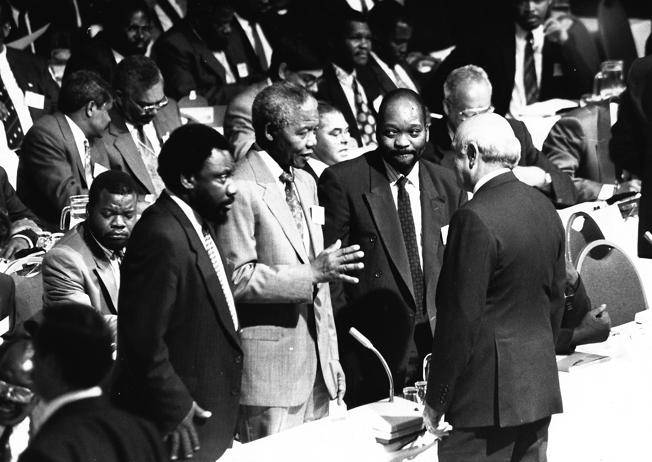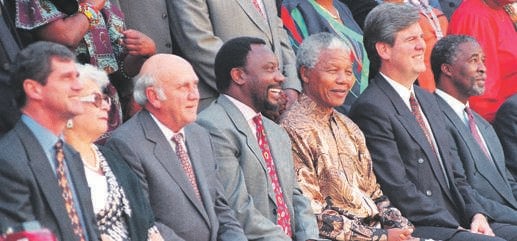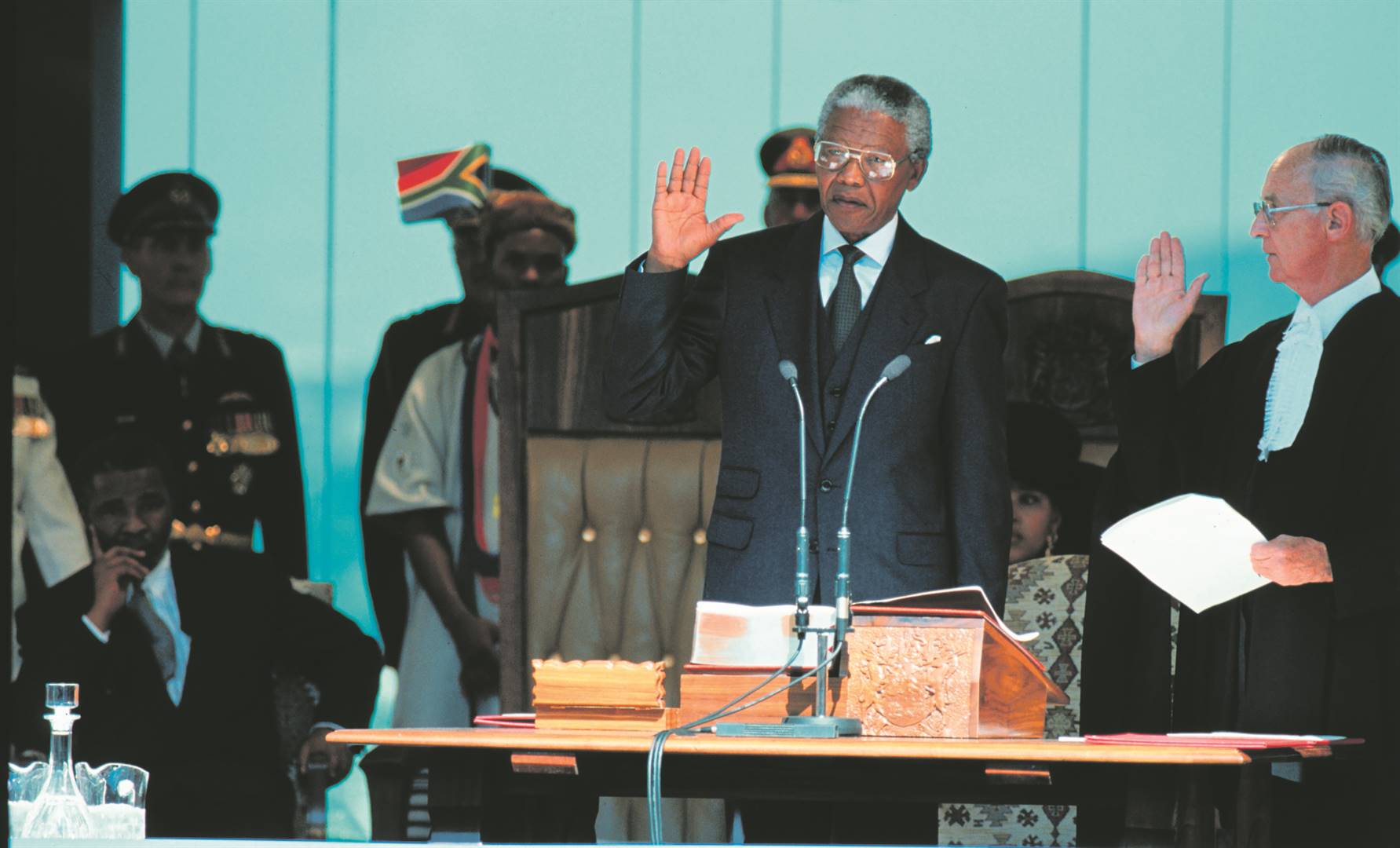
South African writer Mandla Langa describes Nelson Mandela’s leadership during the negotiations and dialogue with the Pretoria regime as akin to travelling in a route through volatile traffic. “Madiba had to act as a buffer between the group of negotiators led by [FW] de Klerk and two vehicles coming from both directions – one driven by the expectations of a black majority who would wait no longer, and the other by the right-wing hardliners, influenced by fear and a misplaced righteousness.”
Madiba understood that the decisions taken by De Klerk – to unban political parties, to release political prisoners, to give immunity to exiled freedom fighters and to effectively put an end to the white Afrikaner regime and seek a new path for the country – even if those decisions may have been driven by self preservation, were not widely shared by De Klerk’s National Party (NP) and Afrikaner nationalists, particularly the military far right wing of the NP.
The military and the police were at the centre of the apartheid state. They enjoyed impunity in their criminal crusades, had unlimited access to state laagers and were going to be the biggest losers in the new dispensation.
Not only did Madiba have to negotiate with De Klerk, he also understood the tact needed to stave off the military right wingers. First, by not making De Klerk look weak to the right-wingers during negotiations, but also by finding ways to disarm the military himself.
As a student of history, Madiba knew that when the military was not on the side of the revolution, they always usurped the vacuum of power caused by the revolution in the name of trying to restore order.
As Madiba would have suspected, an intelligence report was brought to him accusing some military generals of plotting to disrupt the negotiations, kidnap De Klerk and impose military rule. After Madiba assessed the intelligence and found it to be credible, it was time to pull rabbits out of his hat.
As Langa tells it, Madiba used the old township tactics where a gangster is stopped through approaching the gangster’s older brother, who in most instances is the only person a gangster listens to or even fears. That older brother in this case was PW Botha.
Madiba made that publicised trip to the Wilderness, Botha’s retirement home, not as a gesture of reconciliation, but to use his influence on the generals to rein them in.
A meeting was later arranged between the generals and ANC representatives, Thabo Mbeki, Jacob Zuma and Penwell Maduna, and the calamity was averted.
SECOND FRONT
The second front Madiba had to close, even as he had to be present every day negotiating this new country’s birth, was the violence in townships and traditional black communities. This particular challenge threatened to derail and even end negotiations as Mandela saw De Klerk as lacklustre and unwilling to do everything he could to stop the violence.
The Boipatong massacre, in which 44 people – mostly ANC members – were killed in cold blood on June 17 1992, became a tipping point and gave Mandela no choice but to cancel the negotiations. At this stage, ANC members had had enough and were asking Mandela to give them the go ahead to avenge their comrades killed by Inkatha Freedom Party (IFP) members.
Madiba knew that this black-on-black violence served the NP agenda and weakened the ANC in the eyes of the people. Madiba, as troubled as he was by the IFP attacks on the ANC base areas, understood that: “Peace does not include a vendetta; there will be neither winners nor losers.”
However, Madiba had his limits in his peace-making agenda and when the IFP members decided to test Madiba’s patience by attacking the ANC’s headquarters in downtown Joburg, Madiba gave instructions that Shell House be defended at all costs. A bloody day for the IFP, which shook them out of their madness. They would never test the ANC again.
It took an appeal and intervention, as Madiba’s book tells it, by Kenneth Kaunda to get the ANC back to the negotiation table. Kaunda reminded the ANC that the apartheid government was violent, and until it was dismantled, there would most likely be violence.
The focus must therefore be on ending apartheid. Negotiations later resumed in earnest in order to end the apartheid regime soonest. A date was set for elections and there was then a clear programme.
Violence, however, seemed to intensify the closer to its end the apartheid government got. The murder of Chris Hani a year later – on April 10 1993 – had the country teetering on the verge of a civil war and touched a nerve. Madiba had no choice this time but to take over the presidency of the country from a De Klerk who had clearly lost control of critical levers of the state.
Many people have said Mandela actually became president that week, when he took over the state broadcaster and spoke to the nation – every bit looking and sounding presidential. Madiba reminded the country what Hani stood for, what his entire life had been about, and the need to fulfill the purposes of Hani’s life, which was lived for the liberation of the African people.
Then there was the violence in KwaZulu-Natal taking a life of its own, rivalling even the violent mid-1980s. Madiba was going to end the violence, whatever the cost, whatever the sacrifice. Two weeks after being released from prison, Madiba was in a 100 000-packed Kings Park stadium in Durban, KwaZulu-Natal, asking those in attendance and millions who listened on radio and watched on TV to “take their weapons and throw them into the sea.” Madiba quickly realised that in the coastal province, there was more affinity with Zulu king Goodwill Zwelithini than with the IFP.
So, Madiba needed to create a solid relationship with the king, independent of IFP leader Mangosuthu Buthelezi, who had positioned himself as the voice of the Zulu nation and his party as a party of the Zulus.
Of course, Madiba did have a relationship with Buthelezi that went as far back as their days at the University of Fort Hare. There was of course also Zuma who had a good standing with the Zulu nation to champion the ANC cause.
The challenges were not only outside. As the ANC was getting closer to power, new friends were emerging and finding a way into the ANC, with sinister intentions. Madiba was most aware of challenges facing former freedom fighters. He had expressed his concerns when he said: “Freedom and installation of [a] democratic government brings erstwhile liberators from the bush to the corridors of power, where they now rub shoulders with the rich and mighty. In such situations, some former freedom fighters run the risk of forgetting principles and those who remain in poverty, disease and no education.
“Some freedom fighters start aspiring to the lifestyle of the oppressors they once detested and overthrew.”
Big business, foreign business and international spy agencies with deep pockets, all ascended on the soon to be the new political power base and sought their own piece of action through tempting the liberation fighters, many of whom had desperate financial needs. Comrades were meeting the biggest carrot danglers in the world at the cusp of power but also at their most vulnerable points. Madiba knew all the challenges facing his comrades and was going to instil and inspire discipline.
CHALLENGES
Madiba wanted the ANC itself to step up to these challenges and hold the line. He said: “Unless their political organisation remains strong and principled, exercising strict discipline on leaders as well as ordinary members alike, and inspires its membership, apart from government programmes, to develop social initiatives to uplift the community, the temptation to abandon the poor and to start amassing enormous wealth for themselves becomes irresistible.”
Madiba understood that the primary task of his presidency was to stabilise the country, and bring all the warring factions that remained deeply suspicious of one another to a point where they could find common ground and minimum programmes of mutual interest, a delicate process. Uprooting the seeds of violence and creating conditions of peace were preconditions to all other goals that lay ahead.
Read: Mandela Day: Grow up South Africa
Madiba was also driven by a core belief, stated and fought for by many other leaders before him, of constructing a nonracial, nonsexist and an egalitarian society. Despite the history of the ANC on nonracialism, going back to its founding, it was still aspirational at best. Making a dream of a nonracial country now fell squarely on Madiba’s moment in history and he was ready.
In all these monumental tasks, given as they were by time and history, Mandela succeeded. He got out of prison almost a mystical figure in his greatness. He took that greatness to new levels, taking on the most difficult tasks, asking all of us to open our hearts and create a new world, inspiring us to see ourselves as participants in building a new country of our dreams.
Thank you Madiba. We are happy to report to you that we have dedicated our lives to a like-work of our own.
Diko is a media strategist and political commentator




 Publications
Publications
 Partners
Partners










